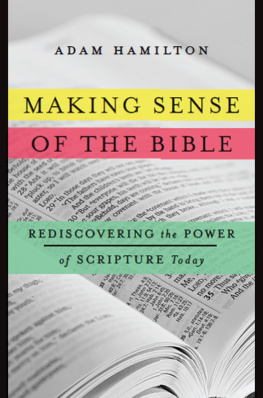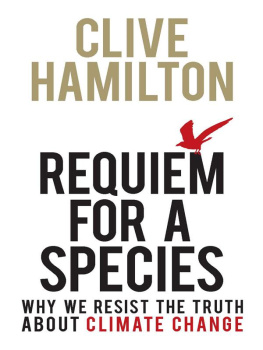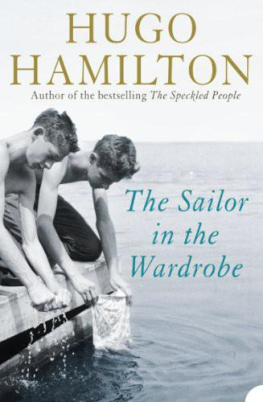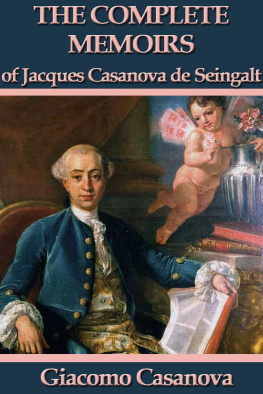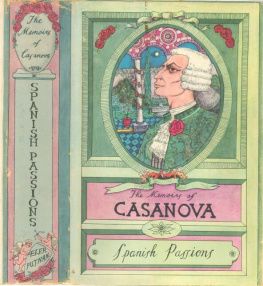BIOGRAPHICAL SKETCH OF ANTHONY HAMILTON.
Anthony Hamilton, the celebrated author of the Grammont Memoirs, much cannot now be with certainty known.
[For uniformitys sake the writer of this sketch has followed the Memoirs in the spelling of this name; but he thinks it necessary to observe that it should be Gramont, not Grammont.]
The accounts prefixed to the different editions of his works, down to the year 1805, are very imperfect; in that year a new, and, in general, far better edition than any of the preceding ones, was published in Paris, to which a sketch of his life was also added; but it contains rather just criticisms on his works, than any very novel or satisfactory anecdote concerning himself. It is not pretended here to gratify literary curiosity as fully as it ought to be, with regard to this singular and very ingenious man; some effort, however, may be made to communicate a few more particulars relative to him, than the public has hitherto, perhaps, been acquainted with.
Anthony Hamilton was of the noble family of that name: Sir George Hamilton, his father, was a younger son of James, Earl of Abercorn, a native of Scotland. His mother was daughter of Lord Thurles, and sister to James, the first Duke of Ormond; his family and connections therefore, on the maternal side, were entirely Irish. He was, as well as his brothers and sisters, born in Ireland, it is generally said, about the year 1646; but there is some reason to imagine that it was three or four years earlier. The place of his birth, according to the best family accounts, was Roscrea, in the county of Tipperary, the usual residence of his father when not engaged by military or public business.
[In September, 1646, Owen ONeale took Roscrea, and, as Carte says, put man, woman, and child to the sword, except Sir George Hamiltons lady, sister to the Marquis of Ormond, and some few gentlewomen whom he kept prisoners. No family suffered more in those disastrous times than the house of Ormond. Lady Hamilton died in August, 1680, as appears from an interesting and affecting letter of her brother, the Duke of Ormond, dated Carrick, August 25th. He had lost his noble son, Lord Ossory, not three weeks before.]
It has been always said, that the family migrated to France when Anthony was an infant; but this is not the fact: Sir George Hamilton, says Carte, would have accompanied his brother-in-law, the Marquis of Ormond, to France, in December, 1650: but, as he was receiver-general in Ireland, he stayed to pass his accounts, which he did to the satisfaction of all parties, notwithstanding much clamour had been raised against him. When that business was settled, he, in the spring of 1651, took Lady Hamilton and all his family to France, and resided with Lord and Lady Ormond, near Caen, in Normandy, in great poverty and distress, till the Marchioness of Ormond, a lady whose mind was as exalted as her birth, went over to England, and, after much solicitation obtained two thousand pounds a year from her own and, her husbands different estates in Ireland.
[Hence possibly Voltaires mistake in stating that Hamilton was born at Caen, in his Catalogue des Ecrivains du Siecle de Louis XIV.]
This favour was granted her by Cromwell, who always professed the greatest respect for her. The Marchioness resided in Ireland, with the younger part of her family, from 1655 till after the Restoration; while the Marquis of Ormond continued for a considerable part of that period with his two sisters, Lady Clancarty and Lady Hamilton, at the Feuillatines, in the Faubourg St. Jacques, in Paris.
It appears from a letter of the Marquis to Sir Robert Southwell, that, although he himself was educated in the Protestant religion, not only his father and mother, but all his brothers and sisters, were bred, and always continued, Roman Catholics. Sir George Hamilton also, according to Carte, was a Roman Catholic; Anthony, therefore, was bred in the religion of his family, and conscientiously adhered to it through life.
[That historian states that the king (Charles I.) deprived several papists of their military commissions, and, among others, Sir George Hamilton, who, notwithstanding, served him with loyalty and unvarying fidelity.]
He entered early into the army of Louis XIV., as did his brothers George, Richard, and John, the former of whom introduced the company of English gens darmes into France, in 1667, according to Le Pere Daniel, author of the History of the French Army, who adds the following short account of its establishment: Charles II., being restored to his throne, brought over to England several catholic officers and soldiers, who had served abroad with him and his brother, the Duke of York, and incorporated them with his guards; but the parliament having obliged him to dismiss all officers who were Catholics, the king permitted George Hamilton to take such as were willing to accompany him to France, where Louis XIV. formed them into a company of gens darmes, and being highly pleased with them, became himself their captain, and made George Hamilton their captain-lieutenant:[They were composed of English, Scotch, and Irish.] Whether Anthony belonged to this corps I know not; but this is certain, that he distinguished himself particularly in his profession, and was advanced to considerable posts in the French service.
Anthony Hamiltons residence was now almost constantly in France. Some years previous to this he had been much in England, and, towards the close of Charles II.s reign, in Ireland, where so many of his connections remained. When James II. succeeded to the throne, the door being then opened to the Roman Catholics, he entered into the Irish army, where we find him, in 1686, a lieutenant-colonel in Sir Thomas Newcomens regiment. That he did not immediately hold a higher rank there, may perhaps be attributed to the recent accession of the king, his general absence from Ireland, the advanced age of his uncle, the Duke of Ormond, and, more than all, perhaps, to his Graces early disapprobation of Jamess conduct in Ireland, which displayed itself more fully afterwards, especially in the ecclesiastical promotions.
Henry, Earl of Clarendon, son to the lord-chancellor, was at that time lord-lieutenant of Ireland, and appears, notwithstanding his general distrust and dislike of the Catholics, to have held Anthony Hamilton in much estimation: he speaks of his knowledge of, and constant attention to, the duties of his profession; his probity, and the dependance that was to be placed on him, in preference to others of the same religious persuasion, and, in October, 1686, wrote to the Earl of Sunderland respecting him, as follows: I have only this one thing more to trouble your lordship with at present, concerning Colonel Anthony Hamilton, to get him a commission to command as colonel, though he is but lieutenant-colonel to Sir Thomas Newcomen, in regard of the commands he has had abroad: and I am told it is often done in France, which makes me hope it will not be counted an unreasonable request. I would likewise humbly recommend to make Colonel Anthony Hamilton a privy-councillor here. Lord Clarendons recommendations were ultimately successful: Hamilton was made a privy-councillor in Ireland, and had a pension of L200 a year on the Irish establishment; and was appointed governor of Limerick, in the room of Sir William King, notwithstanding he had strongly opposed the new-modelling of the army by the furious Tyrconnel. In the brief accounts which have been given of his life, it is said that he had a regiment of infantry; but, though this is very probable, there is no mention whatever of his commanding a regiment in the lists published of King Jamess army, which are supposed to be very accurate: he is indeed set down among the general officers. Lord Clarendon, in one of his letters to the lord-treasurer, states, That the news of the day was, that Colonel Russell was to be lieutenant-colonel to the Duke of Ormonds regiment, and that Colonel Anthony Hamilton was to have Russells regiment, and that Mr. Luttrell was to be lieutenant-colonel to Sir Thomas Newcomen, in the place of Anthony Hamilton. It is not known whether Anthony was present at the battle of the Boyne, or of Aughrim: his brother John was killed at the latter; and Richard, who was a lieutenant-general, led on the cavalry with uncommon gallantry and spirit at the Boyne it is to be wished that his candour and integrity had equalled his courage; but, he acted with great duplicity; and King Williams contemptuous echoing back his word to him, when he declared something on his honour, is well known: He is frequently mentioned by Lord Clarendon, but by no means with the same approbation as his brother. After the total overthrow of Jamess affairs in Ireland, the two brothers finally quitted these kingdoms, and retired to France. Richard lived much with the Cardinal de Bouillon, who was the great protector of the Irish in France, and kept (what must have been indeed highly consolatory to many an emigrant of condition) a magnificent table, which has been recorded in the most glowing and grateful terms, by that gay companion, and celebrated lover of good cheer, Philippe de Coulanges, who occasionally mentions the amiable Richard Hamilton as one of the cardinals particular intimates. Anthony, who was regarded particularly as a man of letters and elegant talents, resided almost entirely at St. Germain: solitary walks in the forest of that place occupied his leisure hours in the morning; and poetical pursuits, or agreeable society, engaged the evening: but much of his time seems to have rolled heavily along; his sister, Madame de Grammont, living more at court, or in Paris, than always suited his inclinations or his convenience. His great resource at St. Germain was the family of the Duke of Berwick (son of James II.): that nobleman appears to have been amiable in private life, and his attachment to Hamilton was steady and sincere. The Duchess of Berwick was also his friend. It is necessary to mention this lady particularly, as well as her sisters: they were the daughters of Henry Bulkeley, son to the first viscount of that name: their father had been master of the household to Charles: their mother was Lady Sophia Stewart, sister to the beautiful Duchess of Richmond, so conspicuous in the Grammont Memoirs. The sisters of the Duchess of Berwick were Charlotte, married to Lord Clare, Henrietta, and Laura. They all occupy a considerable space in Hamiltons correspondence, and the two last are the ladies so often addressed as the Mademoiselles B.; they are almost the constant subjects of Hamiltons verses; and it is recorded that he was a particular admirer of Henrietta Bulkeley; but their union would have been that of hunger and thirst, for both were very poor and very illustrious: their junction would, of course, have militated against every rule of common prudence. To the influence of this lady, particularly, we are indebted for one or two of Hamiltons agreeable novels: she had taste enough to laugh at the extravagant stories then so much in fashion, plus arabes quen Arabie, as Hamilton says; and he, in compliance with her taste, and his own, soon put the fashionable tales to flight, by the publication of the Quatre Facardins, and, more especially, La Fleur dEpine.



